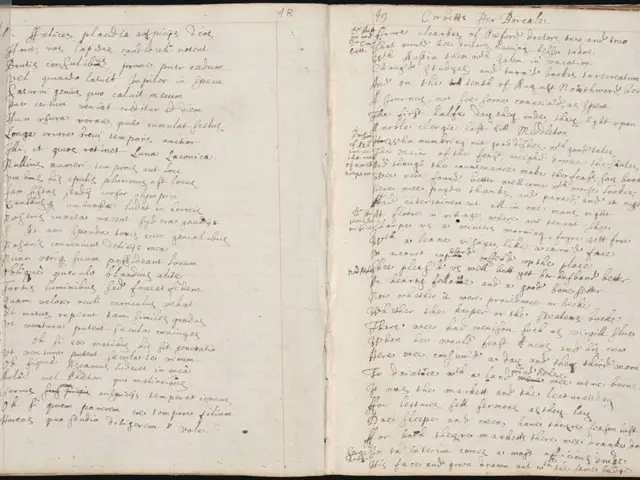Visionary Writer in the Realm of Modernist Literature: Virginia Woolf
Bold and Raw: The Phenomenal Virginia Woolf
Get ready for a wild dive into the world of one of literature's most daring and influential figures – Virginia Woolf! Born in 1882 in the heart of London, she was smack-dab in the middle of the literary and artistic whirlwind of the early 20th century.
Woolf made a massive impact on literature thanks to her unique narrative style that spilled open the layers of her characters' minds. Ever heard of stream-of-consciousness writing? Yeah, she's the one who made it a big deal! This style not only revolutionized narrative structures of her time but also gave readers a front-row seat to the inner workings of human consciousness.
Ever read "Mrs. Dalloway," "To the Lighthouse," or "Orlando"? Woolf's novels explore complex themes like identity, time, and reality, further cementing her status as a pivotal voice in the feminist literary movement.
Woolf was more than just a brilliant writer; she was also a member of the Bloomsbury Group, a group of English writers, intellectuals, philosophers, artists, and a few other eccentrics. This collective further boosted her influence on the literary scene and artistic spheres. Her essays, like "A Room of One's Own" and "Three Guineas," continue to provoke discussions about gender equality and the role of women in literature and life.
Grab a chair, sit back, and let's delve deeper into Woolf's life, her work, and her enduring impact on the literary landscape. Understanding Woolf's legacy is crucial for appreciating the evolution of both literature and social thought in the 20th century.
The Unstoppable Flow of Thought: Virginia Woolf's Inimitable Style
One of Virginia Woolf's greatest contributions to literature is her pioneering use of stream-of-consciousness narrative. This technique gives readers an up-close peek into the continuous flow of a character's thoughts, feelings, and memories without a clear chronological or logical sequence. It's like inviting readers to join the personal symphony happening inside a character's mind.
In "Mrs. Dalloway," Woolf nails this technique, moving smoothly between the perspectives of various characters on a single day. The narrative delves deep into their inner lives, unveiling their fears, joys, and regrets. Woolf's method shatters traditional narrative forms and reflects the fragmented, multifaceted nature of human consciousness.
This masterful blend of the external and internal worlds of her characters showcases Woolf's sensitivity to the complexities of human experience. By drawing back the curtain on people's minds, Woolf invites readers to question the nature of time and existence.
Virginia Woolf Opens Up Dialogues on Women's Roles and Women's Rights
Virginia Woolf's work is tightly interwoven with feminist thought and has become a cornerstone of feminist literature. Woolf routinely questioned and criticized the societal constraints imposed on women, championing their intellectual and creative freedom.
In her revolutionary essay "A Room of One's Own," Woolf insists that women need financial independence and a private space free from interruptions to produce great literature. Her essay challenges systemic barriers preventing women from reaching their full potential, calling for a reevaluation of women's place in society.
"To the Lighthouse" and "Mrs. Dalloway" are also marked by Woolf's feminist concerns. The female characters in these novels struggle beneath the weight of societal expectations and confront these limitations imposed by a patriarchal society.
Woolf didn't just advocate for women's rights in her writing; she was an active participant in suffrage movements and a vocal champion of women's rights. Her essays and letters underscore her dedication to gender equality and her vision for a more inclusive and equitable society.
The Bloomsbury Group: A Creative Powerhouse
Virginia Woolf was front and center in the Bloomsbury Group, a formidable collective of English writers, artists, and intellectuals. This group, including heavyweights like E.M. Forster, Lytton Strachey, John Maynard Keynes, and Woolf's very own sister, Vanessa Bell, was known for its avant-garde ideas and progressive attitudes toward art, literature, and society.
This group tackled tradition head-on, embracing liberal, bohemian lifestyles that valued intellectual discussion, artistic experimentation, and personal freedom. The group's collaborative spirit enriched Woolf's writing, inspiring her diverse range of ideas and themes.
Woolf's Lasting Influence on Modernist Literature
Virginia Woolf's creative genius and innovative spirit have continued to shape modernist literature. Her experimental narrative techniques, introspective character studies, and exploration of complex themes have influenced countless writers, reshaping the face of 20th-century fiction.
Talented storytellers like Ali Smith, Ian McEwan, and Jeanette Winterson have acknowledged Woolf's influence on their work. Her remarkable legacy can be seen in their cutting-edge narrative styles, captivating characters, and mind-bending explorations of the human condition.
Virginia Woolf's enduring influence on modernist literature has solidified her place as a foundational figure in this influential literary movement. Her literary brilliance and her unwavering commitment to artistic freedom continue to inspire contemporary writers and artists, encouraging them to question societal structures, explore the intricacies of human consciousness, and advocate for gender equality.
- The pioneering use of stream-of-consciousness narrative by Virginia Woolf presents a unique opportunity for readers to delve into the continuous flow of a character's thoughts, emotions, and memories without conventional chronology or logic, offering an intimate peek into the personal symphony of a character's mind.
- In "Mrs. Dalloway," Woolf masterfully deploys this narrative technique by moving seamlessly among different characters, revealing their individual inner lives and exposing their fears, joys, and regrets, thereby shattering traditional narrative forms and reflecting the chaotic, complex nature of human consciousness.
- Virginia Woolf's career extends beyond literature, embracing contributions in fields such as fashion-and-beauty, with her distinctive personal style reflecting the artistic and intellectual milieu of the early 20th century.
- Woolf's presence in the Bloomsbury Group - a circle of English writers, intellectuals, philosophers, artists, and eccentrics - highlighted her significant influence on the literary and artistic circles of her time, giving way to a rich creative output and fueling avant-garde ideas.
- The revolutionary essays of Woolf, such as "A Room of One's Own" and "Three Guineas," continue to spark discussions on gender equality and women's roles in literature and society, presenting compelling arguments for financial independence and private personal space for women.
- An astute observer of human nature and a creative thought leader, Woolf's work transcends time, contributing to various sectors, including education-and-self-development, personal-growth, and career-development, offering readers insights into self-discovery, introspection, and progressive thinking.
- As a lifelong advocate for gender equality and women's rights, Woolf's involvement in suffrage movements and her passionate championing of women's rights has left an indelible mark on the intellectual landscape, inspiring subsequent feminist literary works and furthering conversations on this essential topic.








